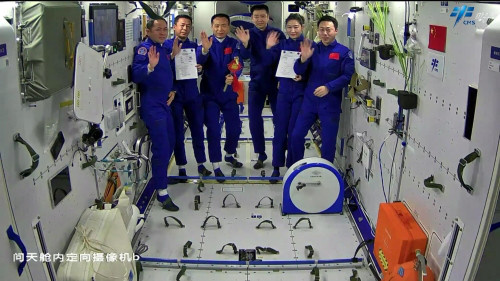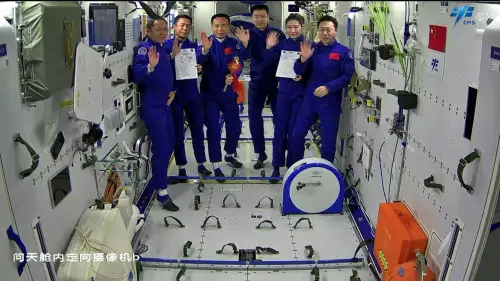By Du Yifei, People's Daily

The Shenzhou-14 and Shenzhou-15 crew pose for a group photo on China's space station on Dec. 2, 2022. (Photo from the website of China manned space engineering)
China recently launched the manned spaceship Shenzhou-15. The launch marks the final one at the construction stage of its space station.
China began construction of the space station with the launch of Tianhe core module - the main living quarters for astronauts - in April 2021. Under a tight schedule of 19 months, the country has delivered all of the 11 launches and sent a total of 12 astronauts on four missions for the in-orbit construction of the space station. Two re-entry capsules of China's manned spaceship missions successfully returned to earth, and Chinese astronauts completed their extravehicular activities for seven times. The complete construction of the T-shaped space station as scheduled reflects China's robust development in the domain of manned space technology.
China's space station will enter a phase of application and development lasting more than 10 years. Astronauts will stay in orbit to conduct research on space science and explore the universe. The space station will provide an open platform for global cooperation on space exploration.
China's space station is the first project of its kind that is open to all United Nations (UN) member states. So far, there are already nine projects involving 17 countries, including Switzerland, Poland, Germany and Italy, and 23 entities selected among the first batch of scientific experiments to be carried out on the space station, covering frontier fields such as space astronomy, space life science and biotechnology, space medicine, space physics, and applied new technologies. These scientific experiments will begin in 2023, according to Ji Qiming, spokesperson for the China Manned Space Agency (CMSA).
China has always welcomed astronauts from other countries to enter its space station to conduct experiments, Ji added. China has received requests from several countries to send astronauts to participate in its space station missions, and the country is coordinating with relevant parties and actively preparing for the training of foreign astronauts.
China's opening up of the space station to the world has vividly demonstrated it's commitment to win-win cooperation, and fully reflected the country's adherence to openness and inclusiveness, and its determination to build a community with a shared future for mankind.
Simonetta Di Pippo, director of the United Nations Office for Outer Space Affairs (UNOOSA), said China's opening up of the space station to the world is an important part of the UN's "Access to Space for All" initiative and a great example.
To explore the unknown universe and develop space technology is the common course of human beings, and international cooperation is the trend of space development. China's opening up of the space station to the world vividly reflects that China has actively carried out international exchanges and cooperation in outer space by following the principles of equality, mutual benefit, peaceful utilization, and inclusive development.
In nearly ten years, China has signed 84 space cooperation agreements or memoranda of understanding with 34 national space agencies and four international organizations and space cooperation outlines with nine national space agencies. It has also participated in the activities of 18 international organizations, including the UN Committee on the Peaceful Use of Outer Space (COPUOS).
China has carried out in-depth cooperation in the country's Chang'e-4 lunar probe and Tianwen-1 Mars probe and worked with international scientists to analyze exploration data obtained by the two probes. By sharing the 16-meter resolution data obtained by Gaofen satellites with global users, China has provided high-definition data products and spatial information support for more than 150 countries around the world, including those along the Belt and Road.
The country has also taken the lead in initiating multilateral cooperation projects such as the Belt and Road Initiative Space Information Corridor, the Asia-Pacific Region Multilateral Cooperation in Small Multi-Mission Satellites Project, and the BRICS Remote-Sensing Satellite Constellation.
China has promoted progress of the space industry for mankind as a whole and its long-term sustainable development by taking concrete actions.
With the space station entering the application and development phase, China will continue to adhere to the development concept of openness and sharing, and carry out more and deeper pragmatic cooperation with countries and regions committed to the peaceful utilization of outer space, so that the sci-tech achievements of China's space station will benefit all mankind.
China began construction of the space station with the launch of Tianhe core module - the main living quarters for astronauts - in April 2021. Under a tight schedule of 19 months, the country has delivered all of the 11 launches and sent a total of 12 astronauts on four missions for the in-orbit construction of the space station. Two re-entry capsules of China's manned spaceship missions successfully returned to earth, and Chinese astronauts completed their extravehicular activities for seven times. The complete construction of the T-shaped space station as scheduled reflects China's robust development in the domain of manned space technology.
China's space station will enter a phase of application and development lasting more than 10 years. Astronauts will stay in orbit to conduct research on space science and explore the universe. The space station will provide an open platform for global cooperation on space exploration.
China's space station is the first project of its kind that is open to all United Nations (UN) member states. So far, there are already nine projects involving 17 countries, including Switzerland, Poland, Germany and Italy, and 23 entities selected among the first batch of scientific experiments to be carried out on the space station, covering frontier fields such as space astronomy, space life science and biotechnology, space medicine, space physics, and applied new technologies. These scientific experiments will begin in 2023, according to Ji Qiming, spokesperson for the China Manned Space Agency (CMSA).
China has always welcomed astronauts from other countries to enter its space station to conduct experiments, Ji added. China has received requests from several countries to send astronauts to participate in its space station missions, and the country is coordinating with relevant parties and actively preparing for the training of foreign astronauts.
China's opening up of the space station to the world has vividly demonstrated it's commitment to win-win cooperation, and fully reflected the country's adherence to openness and inclusiveness, and its determination to build a community with a shared future for mankind.
Simonetta Di Pippo, director of the United Nations Office for Outer Space Affairs (UNOOSA), said China's opening up of the space station to the world is an important part of the UN's "Access to Space for All" initiative and a great example.
To explore the unknown universe and develop space technology is the common course of human beings, and international cooperation is the trend of space development. China's opening up of the space station to the world vividly reflects that China has actively carried out international exchanges and cooperation in outer space by following the principles of equality, mutual benefit, peaceful utilization, and inclusive development.
In nearly ten years, China has signed 84 space cooperation agreements or memoranda of understanding with 34 national space agencies and four international organizations and space cooperation outlines with nine national space agencies. It has also participated in the activities of 18 international organizations, including the UN Committee on the Peaceful Use of Outer Space (COPUOS).
China has carried out in-depth cooperation in the country's Chang'e-4 lunar probe and Tianwen-1 Mars probe and worked with international scientists to analyze exploration data obtained by the two probes. By sharing the 16-meter resolution data obtained by Gaofen satellites with global users, China has provided high-definition data products and spatial information support for more than 150 countries around the world, including those along the Belt and Road.
The country has also taken the lead in initiating multilateral cooperation projects such as the Belt and Road Initiative Space Information Corridor, the Asia-Pacific Region Multilateral Cooperation in Small Multi-Mission Satellites Project, and the BRICS Remote-Sensing Satellite Constellation.
China has promoted progress of the space industry for mankind as a whole and its long-term sustainable development by taking concrete actions.
With the space station entering the application and development phase, China will continue to adhere to the development concept of openness and sharing, and carry out more and deeper pragmatic cooperation with countries and regions committed to the peaceful utilization of outer space, so that the sci-tech achievements of China's space station will benefit all mankind.
 Menu
Menu
 China's space station provides open platform for global cooperation
China's space station provides open platform for global cooperation
















